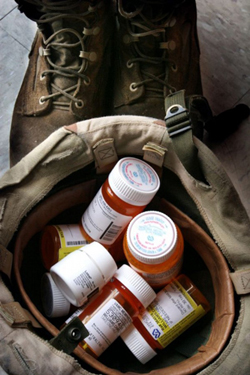By Kelly Patricia O’Meara
Published by CCHR International
The Mental Health Industry Watchdog
November 11, 2016
Veterans Day is this nation’s opportunity to remember those who have courageously served on the front lines and made profound sacrifices to insure the freedoms we continue to enjoy.
Because of these sacrifices, it is the nation’s duty to honor these heroic men and women by insuring that those who gave so much return home to a grateful nation committed to their well-being, including seeking information about whether the psychiatric drug “treatments” prescribed under the guise of “care” may be causing more harm than help, and may be responsible for the epidemic of veterans suicides.
Both Houses of Congress have taken much needed steps. Recently submitted legislation by Congressman David Jolly (R-FL), the Veteran Suicide Prevention Act (H.R. 4640), will go a long way toward upholding the nation’s contract with its returning heroes.
The legislation, which would investigate the long overdue connection between psychiatric drugs and Veteran Suicides, Senator John McCain (R-AZ) has introduced companion legislation in the Senate, the Veterans Overmedication Prevention Act, which directs the Department of Veteran Affairs to conduct an independent study regarding the relationship between veteran suicides and the psychiatric drugs prescribed them.[1]
For years, Citizens Commission on Human Rights (CCHR), a mental health industry watchdog, has called on lawmakers to take an in-depth look into the connection between psychiatric drugs and suicidal behavior of our military given that the drugs carry dozens of international drug regulatory agency warnings citing suicidal ideation as a side effect.
Veterans are killing themselves at a rate of twenty per day—one every 71 minutes.[2] As of 2010, 1.85 million veterans filled at least one psychiatric drug prescription.[3]
Approximately 37% of recent war veterans have been diagnosed with Post Traumatic Stress Disorder (PTSD) and 80 percent of those are prescribed a psychiatric drug. Of the veterans receiving psychiatric drugs for PTSD, 89% are prescribed antidepressants and 34% are prescribed antipsychotics.[4]
Those two classes of drugs alone, antidepressants and antipsychotics, carry 254 international drug regulatory agency warnings, including 38 warnings of suicide, 21 on mania, psychosis and aggression, and 25 on causing death.

Approximately 37% of recent war veterans have been diagnosed with Post Traumatic Stress Disorder (PTSD) and 80 percent of those are prescribed a psychiatric drug.
While few would argue that soldiers returning from combat can suffer severe emotional issues, prescribing them powerful drugs documented to induce suicidal thoughts and psychotic reactions isn’t the help they need. Moreover, according to Colonel Bart Billings, a former military psychologist who started the first U.S. annual conference on Combat Stress more than 25 years ago, “PTSD isn’t a mental disorder. It’s a normal reaction to being in an abnormal environment. Ninety-nine percent of anybody that goes into combat is experiencing Post Traumatic Stress.”[5]
So the question that begs an answer: Do psychiatrists help those suffering from the effects of combat by labeling them mentally ill and prescribing drugs to treat them? The requested study by Rep. Jolly and Sen. McCain can provide some much needed data. Not only for the benefit of our veterans, but because the cost of “treating” PTSD with psychiatric drugs comes with a high price tag. The Veterans Administration’s mental health budget has skyrocketed from nearly $3 billion in 2003 to $7.5 billion in 2016 while the rate of suicide among those using Veterans Health Administration services has increased 12% between 2003 and 2014.
Further, there are numerous examples of veterans prescribed psychiatric drugs documented to cause hostility and violence, who then committed deadly acts under the influence of such drugs.
Ft. Hood shooter, Ivan Lopez, for example, was receiving mental health services and taking Ambien, antidepressants and other drugs to treat anxiety and depression when he killed three and wounded 16.[6] Washington Navy Yard shooter, Aaron Alexis was taking the antidepressant Trazodone when he killed twelve and wounded eight,[7] and Bradley Stone, who killed six family members before killing himself, had been receiving mental health services and had the antidepressant Trazodone and the antipsychotic risperidone in his system at the time of his death.[8]
Antidepressants not only carry the Food and Drug Administration’s (FDA) “Black box” warning for causing suicidality, but 27 international drug regulatory agency warnings cite side effects of violence including mania, hostility, psychosis, aggression and homicidal ideation.
Like Rep. Jolly’s initial legislation, the Veterans Overmedication Prevention Act is requesting very specific information about possible prescription drug connections, including:
- The number of veterans who died by suicide or accidental death in the last five years;
- Prevalence of medications or illegal substances in the system of each veteran who died;
- The number of instances in which the veteran was concurrently on multiple medications prescribed by VA physicians or non-VA physicians;
- Percentage of veterans who are receiving non-medication first-line treatment (such as cognitive behavioral therapy) as treatment and its effectiveness versus other treatments;
- An analysis, by state, of programs of the Department of Veterans Affairs that collaborate with state Medicaid agencies, including an analysis of the sharing of prescription and behavioral health data for veterans; and
- Other aspects of care and recommendations to improve the safety and well-being of veterans.[9]
CCHR honors those who have selflessly given of themselves to insure the nation’s freedoms and believe, for too long, too many of the nation’s best have been needlessly dying and CCHR applauds the efforts by Rep. Jolly and Sen. McCain for taking up their cause.
Kelly Patricia O’Meara is an award-winning former investigative reporter for the Washington Times’ Insight Magazine, penning dozens of articles exposing the fraud of psychiatric diagnosis and the dangers of the psychiatric drugs—including her ground-breaking 1999 cover story, “Guns & Doses,” exposing the link between psychiatric drugs and acts of senseless violence. She is also the author of the highly acclaimed book, Psyched Out: How Psychiatry Sells Mental Illness and Pushes Pills that Kill. Prior to working as an investigative journalist, O’Meara spent sixteen years on Capitol Hill as a congressional staffer to four Members of Congress. She holds a B.S. in Political Science from the University of Maryland.
References:
[1] “Senator John Mccain Introduces Legislation To Prevent Overmedication & Combat Suicide Among Veterans,” 28 Sep 2016, http://www.mccain.senate.gov/public/index.cfm/press-releases?ID=E9297146-E0BA-45C2-AA4A-39B47B88F043.
[2] VA Suicide Prevention Program, Facts about Veteran Suicide, July 2016, http://www.va.gov/opa/publications/factsheets/Suicide_Prevention_FactSheet
_New_VA_Stats_070616_1400.pdf.
[3] Ilse R. Wiechers, MD, MPP, et al., “Increased Risk Among Older Veterans of Prescribing Psychotropic Medication in the Absence of Psychiatric Diagnoses,” Am J Geriatr Psychiatry, Jun 2014, https://www.ncbi.nlm.nih.gov/pubmed/24211029.
[4] Susan Donaldson James, “Marines Battalion Mentally Upbeat, Despite Record Deaths,” ABC News, April 15, 2011, http://www.abcnews.go.com/Health/camp-pendleton-marine-battalion-mentally-fit-deadliest-war/story?id=13377215; Mohamed S, Rosenheck RA, “Pharmacotherapy of PTSD in the U.S. Department of Veterans Affairs: diagnostic- and symptom-guided drug selection,” Journal of Clinical Psychiatry, 2008, June Vol. 69, No. 6, pp. 959-65, http://www.ncbi.nlm.nih.gov/pubmed/18588361.
[5] “Let’s Stop Using Experimental Vaccines and Psych Drugs that are Destroying our Veterans and Military Personnel,” Health Impact News, 2014, http://healthimpactnews.com/2014/lets-stop-using-experimental-vaccines-and-psych-drugs-that-are-destroying-our-veterans-and-military-personnel/.
[6] David Montgomery, Manny Fernandez and Timothy Williams, “Fort Hood Gunman Was Being Treated for Depression,” 3 Apr 2014, http://www.nytimes.com/2014/04/04/us/fort-hood-shooting.html?_r=0; Ben Brumfield, Tom Watkins and Josh Rubin, “Fort Hood shooting spree: ‘Texans’ heart are once again very heavy,’” CNN, 3 Apr 2014, http://www.cnn.com/2014/04/03/us/fort-hood-shooting.
[7] Trip Gabriel, Joseph Goldstein and Michael S. Schmidt, “Suspect’s Past Fell Just Short of Raising Alarm,” The New York Times, 17 Sep 2013, http://www.nytimes.com/2013/09/18/us/washington-navy-yard-shootings.html?pagewanted=all.
[8] Jacqueline Klimas, “Bradley Stone cleared by Veterans Affairs doctor one week before murders, suicide,” The Washington Times, 17 Dec 2014, http://www.washingtontimes.com/news/2014/dec/17/bradley-stone-cleared-veterans-affairs-doctor-one-/; Dan Stamm and Vince Lattanzio, “Montgomery County Spree Killer Bradley Stone Dies of Drug Overdose: ME,” NBC Philadelphia, 24 Dec 2014, http://www.nbcphiladelphia.com/news/local/Bradley-Stone-Death-Overdose-Report-286716351.html.
[9] “Senator John Mccain Introduces Legislation To Prevent Overmedication & Combat Suicide Among Veterans,” 28 Sep 2016, http://www.mccain.senate.gov/public/index.cfm/press-releases?ID=E9297146-E0BA-45C2-AA4A-39B47B88F043.



SHARE YOUR STORY/COMMENT